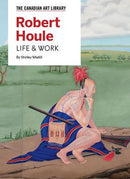Description
Robert Houle RCA is a Saulteaux First Nations Canadian artist, curator, critic, and educator.
Robert Houle has played a critical and defining role in bridging the gap between First Nations artists and the broader Canadian art scene and synthesizing contemporary art styles and Anishnabe traditions for over forty years. From his experience growing up on the Sandy Bay First Nation/Kaa-wii-kwe-tawang-kak in Manitoba to his paintings, installations, and curatorial work, the Saulteaux artist has had a groundbreaking influence on contemporary art and Indigenous culture.
In 1980 Houle resigned from his position as Curator of Contemporary Indian Art at the National Museum of Man (now the Canadian Museum of History), a pivotal moment in his career and one that set him on a path towards a body of remarkable artistic production. With an emotional desire to free ceremonial objects from being relegated to anthropological artifacts, Houle made a promise to devote the rest of his art career to changing perspectives on what constitutes contemporary Indigenous art.
Robert Houle: Life & Work reveals how this extraordinary artist has impacted First Nations visual culture and opened critical discussions on issues surrounding First Nations peoples, including defining Indigenous identity, portraying the impact of colonialism, responding to crises such as Oka, and addressing land claims and residential schools. With insightful prose, author Shirley Madill takes us through the key stages and works of Houle’s career, his writing and curatorial involvement in important high-profile exhibitions such as Land, Spirit, Power: First Nations at the National Gallery of Canada in 1992, and his site-specific and public arts projects. She reveals how Houle has created a renewed vision of the world that includes cultural memory, exposing and challenging the government on political issues affecting Indigenous peoples, including land rights and the rights of Indigenous art and artists, and decolonizing the museum and the self.
This book contains over 80 full-colour illustrations; 4 key chapters: Biography, Key Works, Significance & Critical Issues and Style & Technique; Glossary of important terms, people, and organizations; Illustrated list of public galleries and institutions where you can see the artist’s work.
Robert Houle has played a critical and defining role in bridging the gap between First Nations artists and the broader Canadian art scene and synthesizing contemporary art styles and Anishnabe traditions for over forty years. From his experience growing up on the Sandy Bay First Nation/Kaa-wii-kwe-tawang-kak in Manitoba to his paintings, installations, and curatorial work, the Saulteaux artist has had a groundbreaking influence on contemporary art and Indigenous culture.
In 1980 Houle resigned from his position as Curator of Contemporary Indian Art at the National Museum of Man (now the Canadian Museum of History), a pivotal moment in his career and one that set him on a path towards a body of remarkable artistic production. With an emotional desire to free ceremonial objects from being relegated to anthropological artifacts, Houle made a promise to devote the rest of his art career to changing perspectives on what constitutes contemporary Indigenous art.
Robert Houle: Life & Work reveals how this extraordinary artist has impacted First Nations visual culture and opened critical discussions on issues surrounding First Nations peoples, including defining Indigenous identity, portraying the impact of colonialism, responding to crises such as Oka, and addressing land claims and residential schools. With insightful prose, author Shirley Madill takes us through the key stages and works of Houle’s career, his writing and curatorial involvement in important high-profile exhibitions such as Land, Spirit, Power: First Nations at the National Gallery of Canada in 1992, and his site-specific and public arts projects. She reveals how Houle has created a renewed vision of the world that includes cultural memory, exposing and challenging the government on political issues affecting Indigenous peoples, including land rights and the rights of Indigenous art and artists, and decolonizing the museum and the self.
This book contains over 80 full-colour illustrations; 4 key chapters: Biography, Key Works, Significance & Critical Issues and Style & Technique; Glossary of important terms, people, and organizations; Illustrated list of public galleries and institutions where you can see the artist’s work.


